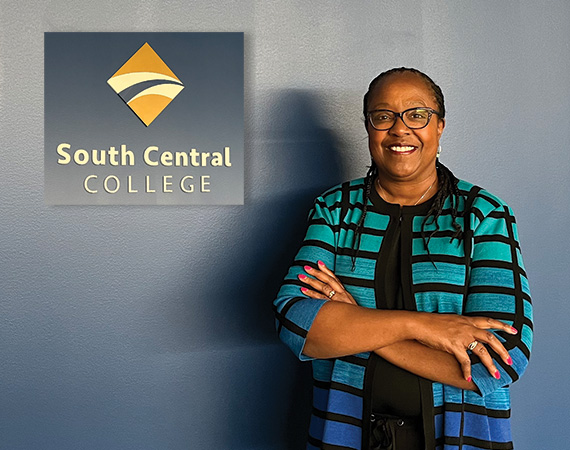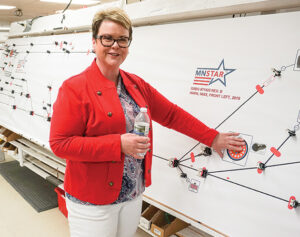Dr. Annette Parker has been the president of South Central College for nine years. She has four decades of experience working within or alongside the manufacturing industry, beginning her career at General Motors. She served on the external Advisory Board for the Massachusetts Institute of Technology (MIT) Task Force on Work of the Future, as well as President Obama’s Advanced Manufacturing Partnership Steering Committee 2.0. Most recently, she began serving on the National Institute of Standards and Technology (NIST) Manufacturing Extension Partnership (MEP) Advisory Board.
How is South Central College responding to the workforce challenges facing the manufacturing industry?
Dr. Parker: The challenges facing the manufacturing industry today are multi-faceted, and one key challenge is that the workforce of the future is just not there — particularly, the workforce with the skills companies need. I’m talking about technical skills and also soft skills.
So, South Central College’s role in that is to partner with employers and understand what they need in a workforce. We tailor a program that meets manufacturers’ needs, making sure that we’re really listening to what skill sets they need and ensuring that’s part of the student experience — whether it’s something we teach at the college or they learn in the workplace on site as part of their educational journey.
I think the workplace internship, dual-training and apprenticeship programs we’re putting together right here in Minnesota are key. The apprenticeships and dual-training through our manufacturing programs generally last a couple of years, whereas an internship might be one semester. We call it “Work, Learn, Earn” at South Central. The students earn a wage from the employer as they advance their skills.
There’s a sense of loyalty with those students as well with that employer, so they tend to stay at the company when they finish their on-site experience.
We also are expanding our services to adult learners. We recently received a $2 million grant from the U.S. Department of Education to advance guided learning pathways for adult learners who are 21 and older as well as underrepresented students. Underrepresented students include first-generation college students, those who are Pell Grant eligible, and students of color. Guided learning pathways provide students with a detailed roadmap to ensure they are taking classes relevant to their program of study so they can be successful and graduate as soon as possible.
How do you prepare students for the manufacturing industry of the future?
Dr. Parker: We’re starting a new initiative that enhances how we communicate with our employers.
Federal law requires our technical programs to have advisory committee meetings, where you bring in the employers twice a year and talk about their progress and get feedback on what they should be doing. Our faculty have been great with that.
But doing so doesn’t really look at how fast the industry is changing and what the employers need 12-18 months from now so that we can get ahead of it.
Sometimes employers say the colleges are slow to respond. We’re thinking about the snapshot of where we are today, and we have processes to implement curriculum like an employer has in implementing a new product run.
But with this new process, we ask, “What do you need 12-18 months from now?” That’s the new thing we’re bringing to the table, and I’m excited about that. We will do this annually.
How did South Central College become designated a Leader College of Achieving the Dream?
Dr. Parker: I used to stop students in the hall and ask, “What are you studying; what are you doing?” and they’d say, “I’m just taking my generals.” They had this idea that they wanted to then transfer to a university.
I know some of them will, should, and could make that transfer, but I would then ask, “What are you going to do after that?” And they had no idea.
In 2017, we joined about 300 institutions across the country in a movement called Achieving the Dream (ATD) that creates an evidence-based culture of student success.
As part of this, we brought in advisors who shared the career opportunities available in numerous fields, especially manufacturing, so that students understand what those opportunities are.
So, when they start at SCC now, they know what programs and career opportunities there are, and can set an individual academic plan with a specific career in mind.
It helps them pick something in our job market with opportunities. Our core economy in southern Minnesota is manufacturing, agriculture, and health care. Students will be aware of the opportunities in these fields, get on a path to pursue that area of interest, and if they change course, they’ll get some advice on how to change course effectively.
After these past four years of ATD, our retention rate for students of color went up in our gateway courses (initial courses in a program of study) by 150%. In English gateway courses, our Hispanic student retention went up 83%. And we’re still implementing some of our goals.
What I say about our job market in manufacturing is that it’s all hands on deck. We don’t have the workforce that we need to help our employers be successful. We need to not lose these students, so we help them understand where those opportunities are and how to get there.
What experiences in your career will help you as you serve on the MEP board?
Dr. Parker: My career started in manufacturing. I understand the critical questions —”How do you achieve that workforce? How will manufacturers have that workforce?” — because I’ve lived it. I understand it as a person who started in manufacturing, in production, and went to community college to advance and do more high-level things in manufacturing. And then to now be president of an institution, I bring all of that wealth of experience to the conversation. So, that’s going to be what I bring to the board.
Each one of us on the board brings a unique skill set, and the other members have done an amazing job of bringing diversified skill sets into the conversation. We’re completing a new strategic plan right now, and I think the key role for me is being part of the conversation on our future workforce.
…
Featured story in the Fall 2022 issue of Enterprise Minnesota magazine.


